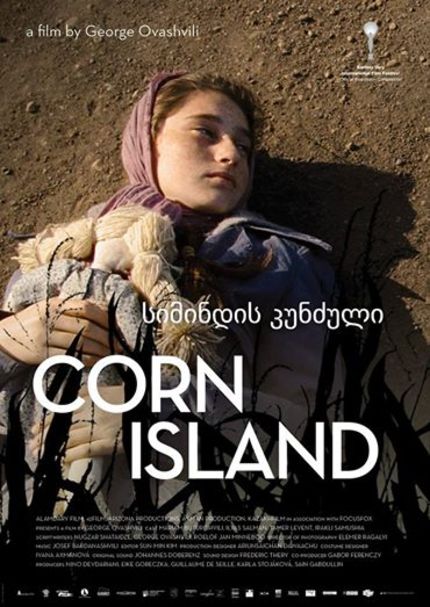Karlovy Vary 2014 Review: CORN ISLAND, A Poetic Contemplation On Humanism

With a difficult production process (the film is co-produced by seven countries) and a diverse production staff (people from 13 nations collaborated), Corn Island looks like a little miracle. That however does not in any sense possible damage the inherent qualities of Ovashvili´s artistic vision, which is perfectly transposed onto the screen. The title refers to an anomalous phenomena of temporary island-like formations created by forces of the nature. An interesting fact and potent metaphor as the existence of such island subjects come and go at the whimsy of the seasons.
A grandfatherly figure on a boat rises from the mist on a river. He searches for fertile ground, ideal for crop cultivation, a necessity to survive the harsh winter. He inspects a potential field and soon he starts hammering out a shack: his second home. What follows is the account of his daily routine: hard work on the field. A granddaughter joins the old man in this endeavour to raise a large food supply.
The slow burning drama capitalizes on nuances and details and Ovashvili uses faces as a second canvas, which with the lack of dialogue (a few lines are spoken), prompts a Dreyer-esque effect. The island is situated on the Enguri River, the natural border separating Georgia from the Republic of Abkhazia, a hardly recognized republic with an exile government residing in Tbilisi forms a political backdrop. The director himself explains the choice for this territory: "...one day in August 1992, this Abkhazian guy with a pistol in his hand said: 'you have to leave our land, you are Georgians. The war has started.' 250.000 ethnic Georgians living in Abkhazia had to leave their land and their homes. A lot Georgians stayed behind, forever." Occasional gunfire interlards sounds of nature reminding the audience of a perpetual tension. While not necessarily a political film, this dimension forms an inherent part to the local life and contributes to the escalating film´s suspense.
The whole film is anchored within the direct perimeter of the island. The whereabouts of the pair's real home are never disclosed. Their refuge on this peaceful island, as well as hesitation when guards patrolling the river while they sail past them bear a deeper signification. This pastoral idyll breaks down by the sudden appearance of a wounded stranger.
Special praise goes to Ilyas Salman and newcomer Mariam Buturishvili as the central duo who deliver striking wordless performances, channeling emotions and inner thoughts via their faces. The director of photography, Elemér Ragalyi, who not only amplifies these performances, takes his top-notch methodological shooting and expands the seemingly dull labour towards solid metaphor.
Special praise goes to Ilyas Salman and newcomer Mariam Buturishvili as the central duo who deliver striking wordless performances, channeling emotions and inner thoughts via their faces. The director of photography, Elemér Ragalyi, who not only amplifies these performances, takes his top-notch methodological shooting and expands the seemingly dull labour towards solid metaphor.
Besides the overall enigmatic minimalism employed throughout the film, Ovashvili's impeccable narrative grace is the crowning achievement of Corn Island. A bevy of folk lore and cinematic elements collide: a grandfather from the school of hard knocks with a recent awareness of the fall of humanism; a granddaughter on the inevitable brink of womanhood, and her advances towards the wounded soldier, whose mere presence poses serious danger to this island Eden. Veteran film viewing instincts start recalculating possible storyline forking as the set-up resembles few templates. Needless to say, the results are more than satisfying and miles away from cliché or stale formula.

Do you feel this content is inappropriate or infringes upon your rights? Click here to report it, or see our DMCA policy.






